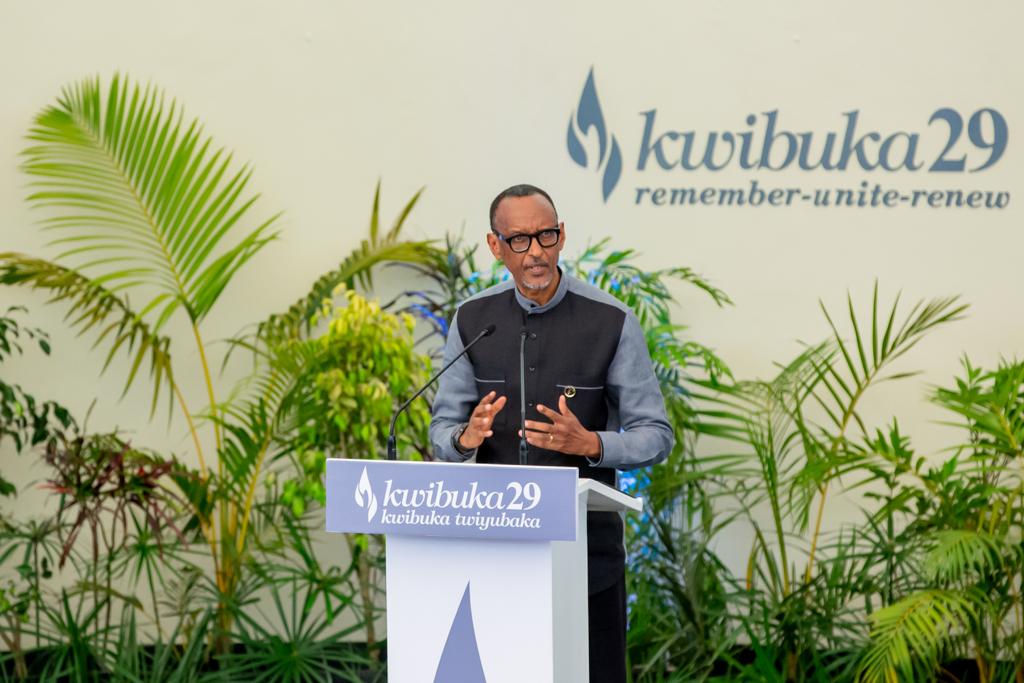Every 7th day of April is for remembrance or what is popularly known Kwibuka. This is in honor of the millions of lives that were lost during the 100 days of the genocide against Tutsi and moderate Hutu.
This year’s commemoration which is the 29th anniversary, was hosted at the Kigali Genocide memorial Center (a site where over 250,000 victims of the genocide were laid to rest). This year’s theme is “Kwibuka – twiyubaka”, loosely translated as “Remember-Unite-Renew”.
The day is also internationally recognized by various partner states. In commemoration of the Rwandan genocide, flags within Rwanda and at all Rwandan Embassies world over were flown at half-mast as the country observed a national mourning week that started on 7th till 13th April 2023. Like every year, Kwibuka is celebrated with several events, from community talks in villages, working places, mass and fellowship services, visiting of genocide memorial centers and ‘walk to remember’.
The Kwibuka National Holiday on 7th April 2023 began with lighting flames of remembrance by the President Paul Kagame and the First Lady, placing wreaths on victims’ graves, and followed by testimonies from some of the survivors, speeches from the President and other dignitaries. While delivering his speech, President Paul Kagame thanked the people of Rwanda for refusing to be defined by this tragic history and instead are able to turn the page and moving forward from mourning, crying and deciding to live on.
“Young Rwandans need to be encouraged to learn about their past, so they can lead with historical clarity, and a sense of accountability and responsibility”, Kagame added.
Background
The Genocide in Rwanda started during the Civil war and was part of the already existing Campaign of ethnic cleaning-up against the minority Tutsi. The widespread and most gruesome ever-recorded killings started with the shooting of a Plane carrying then President- Juvenal Habyarimana and his Burundian counterpart Cyprien Ntaryamira (who were both Hutu). This assassination was believed to be the work of the Rwandan Patriotic Front (whose members were mainly Tutsi) thus contributing to the launch of the revenge campaign by Hutu extremists.
For the subsequent 100 days (between 7th April and 15th July 1994), Political leaders, Army, Militia and other members of the majority Hutu administration advocated for the murder of Tutsi minority and the moderate Hutu. It was until the Rwandan Patriotic Front led by Paul Kagame took over control of Kigali and most of Rwanda in early July of 1994 that the Genocide ended.
In 2003, the UN designated the 7th of April as the day of remembering the millions of lives that were lost during the 1994 Genocide and the first remembrance was held in 2004 (a decade after the gruesome killings). The 29th anniversary came with numerous commemorations within the country and among Rwandans in diaspora.
No Adventure Consults’ trip to Rwanda would be complete without a visit to the Kigali Genocide Memorial! The centrally located museum is a few minutes away from Kigali international airport, and easy to access from all corners of the city. This genocide museum is a centre of education, peacebuilding and honours the memory of the more than one million Rwandans who were killed in 1994. The three permanent exhibitions and burial gardens form part of a meaningful tribute to those who perished and provide a powerful educational tool for all.
More about Rwanda, can send through inquiry to sales@adventureconsults.com

